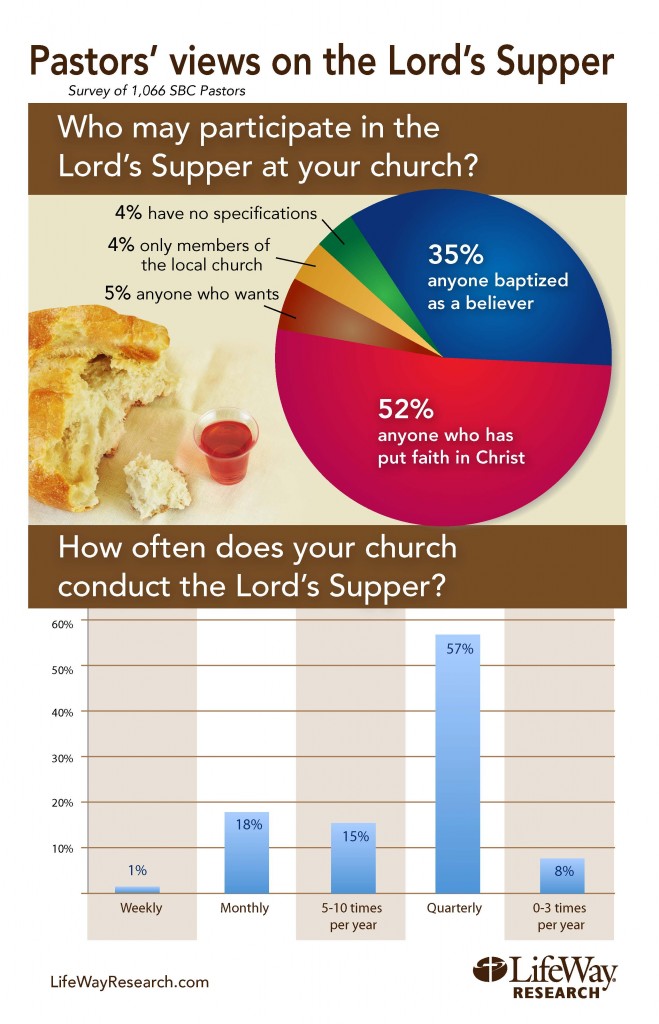For some time now I’ve been giving thought to proposing from the floor of the Southern Baptist Convention annual meeting that we alter the wording of Article VII of the Baptist Faith and Message, the “official” confession of the Southern Baptist Convention. While I have not taken the time to look up the specific dates and wording, such proposals have been made before from the floor of earlier meetings at which I was present. They have never succeeded. I have not decided with certainty that I am going to do this in Houston. I’m mulling it over currently.
Regardless, I’ll be posting some (hopefully) short pieces along and along on this issue as I try to put some of my thoughts in writing. I have already stated my opposition to the wording of Article VII publicly here, in an ealier article in the Arkansas Baptist News on some general thoughts concerning the article and the issue of the Lord’s Supper in general.
For this post, I would simply like to point out two facts: (1) that Article VII of the Baptist Faith and Message restricts the Table of the Lord to those who have been immersed as believers and (2) that the majority of Southern Baptists are living in open conflict with Article VII.
What Article VII Actually Says
The article itself is relatively straight forward, though I note (with some amazement) that a surprising number of Southern Baptist pastors I have spoken to about this seem unaware of what it does, in fact, say.
VII. Baptism and the Lord’s Supper
Christian baptism is the immersion of a believer in water in the name of the Father, the Son, and the Holy Spirit. It is an act of obedience symbolizing the believer’s faith in a crucified, buried, and risen Saviour, the believer’s death to sin, the burial of the old life, and the resurrection to walk in newness of life in Christ Jesus. It is a testimony to his faith in the final resurrection of the dead. Being a church ordinance, it is prerequisite to the privileges of church membership and to the Lord’s Supper.
The Lord’s Supper is a symbolic act of obedience whereby members of the church, through partaking of the bread and the fruit of the vine, memorialize the death of the Redeemer and anticipate His second coming.
Matthew 3:13-17; 26:26-30; 28:19-20; Mark 1:9-11; 14:22-26; Luke 3:21-22; 22:19-20; John 3:23; Acts 2:41-42; 8:35-39; 16:30-33; 20:7; Romans 6:3-5; 1 Corinthians 10:16,21; 11:23-29; Colossians 2:12.
Here we have close communion, the restriction of admittance to the Lord’s Table to those who have been baptized as believers by immersion. To put it another way: (a) true baptism is for believers by immersion, (b) the Lord’s Supper is a church ordinance, (b) all members of the church have been truly baptized, therefore, (c) only those who have been baptized as believers by immersion may partake.
The beginning of the second paragraph may teach closed communion, the restriction of admittance to the Lord’s Table to members of that particular local church. That depends on how strictly one chooses to interpret it.
How Most Southern Baptists View Article VII
In 2012, LifeWay research surveyed over 1,000 pastors concerning how their churches observe the Lord’s Supper. Here are the results.
The implications are clear: 61% of Southern Baptist churches do not bar non-immersed believers from partaking. 96% reject strict closed communion.
In a September 2012 Baptist Press article on the survey, Scott McConnel of LifeWay Research said this:
“Clearly, though, this survey points out a difference between the beliefs expressed in the Baptist Faith and Message, and the Lord’s Supper practices of many Southern Baptist churches.”
The article added:
Article VII of the Baptist Faith and Message 2000 (SBC.net/bfm) lists baptism as a “prerequisite to the privileges of church membership and to the Lord’s Supper.” Article VII also says the Lord’s Supper is for “members of the church.”
Lest any who disagree with the direction I’m going here sense that I am suggesting that our convictions should be determined by majority vote, I would quickly say that I reject such a notion out of hand. Truth is truth, regardless of poll results. That is not my premise. Instead, my premise is this: highly-controverted and majority-ignored assertions on secondary matters are unwise and utterly unnecessary.
Conclusion
As I say, this will be a series of posts touching on this and that aspect of the question at hand. But let me lay my cards on the table. I do not propose that Article VII move from a close/d position to an open position. I simply propose that Article VII define baptism and the Lord’s Supper while leaving the controverted and historically-disputed issue of who is allowed to partake as a local church matter.
There is no reason to address that issue in Article VII at all, and the majority of Southern Baptists disagree anyway.
In my next post in the series I’ll offer a proposed rewrite of Article VII.


Pingback: Why Article VII of the Baptist Faith and Message Should be Changed (Part II) – Walking Together Ministries